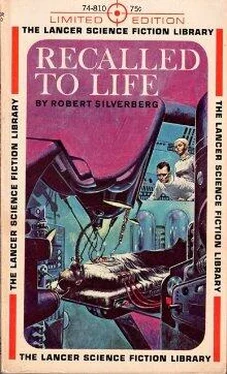“Why do you do that?”
“To protect them. Reanimation is still in its early stages. The social implications are still unclear.”
“Ah. Would you object if the members of this Committee paid the boy a visit, then, to ascertain the current state of his health?”
“That could be arranged,” Raymond said.
There was a moment of silence. Vorys stared keenly at Raymond and said, “Would you trace briefly for us the history of your laboratory, the nature of your process, and the results you have obtained so far.”
Speaking easily and freely now, Raymond told of the original Seller bequest, the gathering-together of the laboratory staff, the early failures. He outlined a rough sketch of the technique as it was now practiced. “To date we’ve had about seventy successful reanimations,” he finished.
“And how many failures?”
“About ten out of the seventy. Previous to our first successful reanimation we had thirty consecutive failures?”
“I see. And what is the nature of these failures?”
Raymond began to fidget. “Ah—well, we don’t succeed in restoring life.”
“The body remains inanimate?”
“Yes. Most of the time, that is. I mean—”
It was too late. Vorys pounced on the slip gleefully and said, “Most of the time, Dr. Raymond? I don’t quite understand. Does that mean that some of your failures result in actual reanimation, or partial reanimation? Will you make yourself clear?”
Panicky, Raymond glanced at Marker, who shrugged and nodded resignedly. It had to come out eventually, Harker thought.
The squirming Raymond was a pitiful sight under the merciless lights. He said in a hopeless voice, “I guess I ought to be more specific.”
“That would help, Dr. Raymond.”
“Well,” Raymond said, “Counting the boy we reanimated when you were at the labs, Senator, we’ve had 72 reanimations since the first success. No, 73. In 62 of those cases, we’ve had complete success. In four others, it was impossible for us to restore life at all. And in the remaining seven”— now it comes out, Harker thought—“we achieved reanimation with partial success.”
“In what way partial?” Vorys pressed.
Raymond had run out of evasions. He said, “We restored the body to functional activity. We were unable to achieve a similar restoration of the mind, in those seven cases.”
The newspapers had a field day with Raymond’s unwilling revelation. Even the traditionally sedate Times devoted six of its eight columns to a banner headline about it, and a story which began:
Public faith in the Beller reanimation process was seriously shaken today by the surprising revelation that reanimation sometimes produces a mentally deficient individual.
Dr. Martin Raymond, head of the Beller research organization, made the statement in New York at the opening session of Senate reanimation hearings. He declared that seven out of seventy-three experimental reanhnations had produced “mindless beings.” In four other instances, neither body nor mind was successfully recalled to life.
In the other papers, it was even worse. The Star-Post, which had been growing more sympathetic each day, demanded atop its editorial column, WHY HAVE THEY BEEN HIDING THIS? The Hearst papers, which had never been sympathetic to the cause of reanimation, grew almost apoplectic now; their key slogan was the label, “The Zombie-Makers,” which they used in reference to the Beller researchers not only in the editorial (a vitriolic one) but even in several of the news columns.
At the Litchfield headquarters, the flood of abusive mail threatened to overpower the local postmaster. It was impossible to read it all, and after Harker picked up a scrawled letter that threatened assassination for him and his entire family unless reanimation experiments ceased, he decided to read none of it at all. They stored it in one of the supply-buildings in back, and Harker gave orders that any overflow was to be destroyed unread.
On the second day of hearings, a few new faces were in the auditorium. They were faces Harker did not enjoy seeing. They belonged to Cal Mitchison and David Klaus, and with them was their lawyer, Gerhardt.
With Senator Thurman still not found, Brewster presided over the second session—a heavy-set, slow-moving man with the ponderously tenacious mind that went with those physical characteristics. With the opening formalities out of the way, Brewster said, “We would like to hear from Dr. David Klaus, formerly of the Beller Research Laboratories.”
Harker was on his feet immediately. “Senator Brewster, I’d like to enter an objection. This man is the principal in a lawsuit pending against our laboratory. Anything he says in his favor this morning may be prejudicial to us in the lawsuit.”
Brewster shook his head slowly. “This is not a court of law, Mr. Harker. We are interested in hearing Dr. Klaus’ statements. You will have ample time to refute them later, if you wish.”
Harker subsided. Brewster looked at Klaus, who stood with his hands knotted nervously together, a thin, slab-jawed, scrawny bright-young-scientific-prodigy type. “Dr. Klaus, you were formerly employed by the Beller Laboratories, were you not? Would you mind telling us why your employment there was terminated?”
Stammering as usual, Klaus said, “I was discharged by order of James Harker shortly after he came to work there. It was a purely malicious act.”
Harker fumed, but Brewster waved imperiously at him to keep him quiet. The Senator said, “Please keep personal differences out of this, Dr. Klaus. How long were you employed at the laboratories? ”
“Three years. I was in charge of enzyme research.”
“I see. And you were aware that the reanimation experiments were occasionally producing—ah—idiots?”
“Yes, sir. We all were aware of that.”
“Were attempts being made to safeguard against this unfortunate result, Dr. Klaus?”
Klaus nodded. “My department was working on a chemical method of insuring full recovery of mental powers. I don’t know what’s been done since my dismissal.”
“He’s lying!” Raymond shouted. “His group never had anything to do with—”
“Please, Dr. Raymond,” Brewster said fiercely. “Your outburst is uncalled-for.”
To Klaus he said, “Do you feel that this hazard of the reanimation process can be overcome in the course of further research?”
“Definitely. But the present management of the laboratories is heading in the wrong direction. They’ve rejected my ideas—which were close to being perfected—and instead chose to suppress the whole affair.”
Harker felt his pulse mounting. Klaus seemed icily calm np there, speaking now with cold precision—most unusual for him. He sounded as if he had rehearsed this speech all morning.
Brewster said, “It would seem to me that the directors of die Beller Laboratories were guilty of an act of bad faith. Wouldn’t you agree, Dr. Klaus?”
“Definitely, sir.”
“Thank you. We would like to hear from Mr. James Harker, now.”
Moistening his lips, Harker rose and took his place in the spotlight. Brewster gave place to Dixon, for which Harker was thankful; the American-Conservative Senators had a way of conducting hearings as if they were representatives of the Spanish Inquisition.
Dixon said, “Would you tell us how you became affiliated with the Beller outfit, Mr. Harker?”
“I was approached by Dr. Lurie of Beller,” Harker said. “I had retired to private law practice after conclusion of my term as Governor of New York State. Dr. Lurie requested me to handle the legal aspects of reanimation.”
Читать дальше












